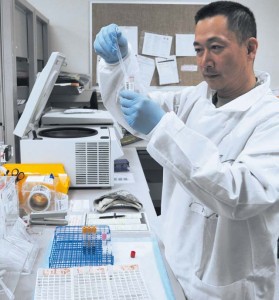Recognizing vital role of lab professionals in health care

Spc. Joon Cho, Landstuhl Regional Medical Center laboratory technician, processes blood samples that will be placed in a centrifuge to separate the blood cells and platelets before being tested for different antigens.
National Laboratory Week takes place from Monday to April 26, but what it highlights is more than 1.5 million tests performed annually at Landstuhl Regional Medical Center. In addition, LRMC labs also provide testing services to 17 outlying military health care facilities in Belgium, Germany and Italy.
The agency responsible for those tests is the LRMC Department of Pathology and Area Laboratory Services, which consists of six divisions: area laboratory compliance and consultation services, anatomic pathology, blood services, central operations, core lab and infectious disease.
A dedicated staff comprised of more than 150 military, civilian and local national is responsible for handling the massive workload. Much of the work is performed out of sight of the rest of the hospital.
“We are happy to honor these unsung heroes of the hospital during National Laboratory Week. They work around the clock to generate the critical results that count for our patients,” said Lt. Col. Michael Licata, director for the DPALS.
Some of the most important steps in lab testing begin within phlebotomy and central operations. LRMC phlebotomists, medical professionals who draw blood from patients for various lab tests and procedures, draw blood for inpatients and more than 100 outpatients each day. In 2012, central operations received and processed more than 120,000 samples from outlying clinics, 26,000 patient drop-off samples and 25,000 samples from theater.
“Central operations is the hub for all lab samples for LRMC and its footprints,” said Capt. Farah Jayman, central operations officer in charge. “It also sends close to 2,500 specimens to reference labs each month.”
The infectious diseases lab works closely with clinicians to provide early diagnosis and optimum management of infectious diseases. It is home to what Maj. Edward Ager, infectious disease OIC, describes as “the microbe experts who identify infectious agents in body fluids and tissues.”
Despite the advanced technology employed in microbiology, however, Ager said there is little automation used by LRMC lab technicians.
“Most of the work depends on the experience, the eyes and even the nose of the technologist,” he said.
Blood services is home to LRMC’s Blood Donor Center, the blood bank and tissue services. The donor center conducted more than 150 blood drives last year, which yielded approximately 5,615 units of blood and 479 units of platelets, while the blood bank processes these donations and provides blood to patients throughout European Command and Africa Command. In 2012, 1,500 blood products were transfused to LRMC patients, said blood services director Lt. Col. Robin Whitacre.
The core lab comprises hematology, chemistry, endocrinology, noncellular immunology, and urinalysis and coagulation labs. The core lab is highly automated with cutting-edge technology used to perform more than 1 million clinical tests annually.
“Core lab is the heart of the laboratory,” said core lab NCOIC Sgt. 1st Class Ryan Doutt.
Anatomic pathology consists of cytology and histology. Cytology prepares and screens more than 2,100 gynecological and non-gynecological slides monthly to rule out malignancies, while histology prepares, cuts and stains more than 150 surgical, cytology and autopsy tissue blocks daily for microscopic examination by eight surgical pathologists.
Area laboratory compliance and consultation services ensures safe and accurate patient laboratory testing. It also provides reporting of 19 point-of-care testing sites within LRMC by constantly monitoring and inspecting for compliance with the College of American Pathologist and Joint Commission standards.
They are also a consulting and monitoring agency for all 17 Army laboratories within the Europe Regional Medical Command footprint.
“Constant oversight and on-site visits were key to the accreditation of all 17 Army health clinics by the College of American Pathologist,” said ALCCS OIC Maj. Jimmey Labit.
“We are proud of our team. They are an excellent group of laboratory professionals working behind the scenes to provide timely and accurate results to improve patient’s health,” said DPALS lab manager Lt. Col. Tracey Wilson.


